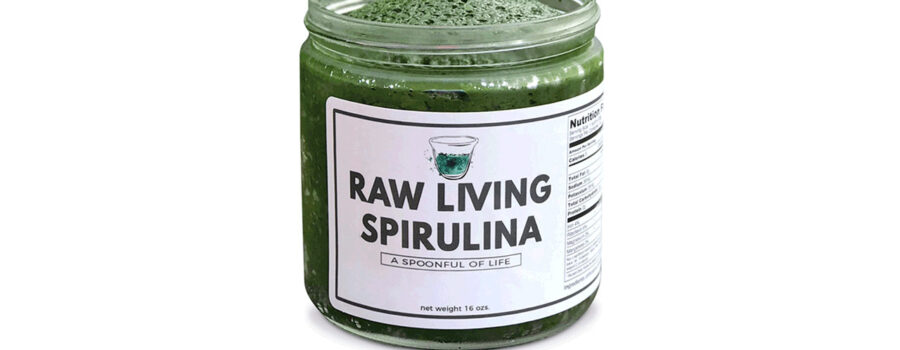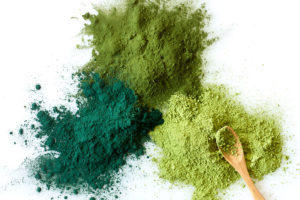Fresh Raw Living Spirulina – The Most Nutrient-Dense Food on the Planet
Fresh Spirulina, a blue-green algae, has gained significant attention as one of the most nutrient-dense food sources available to humans. Its rich nutritional profile and potential health benefits position it as a superfood in plant-based nutrition. To understand why fresh spirulina is considered the most nutrient-dense plant food on the planet, we will explore its composition, health benefits, and how it compares to other food sources.
1. High Protein Content Raw Living Spirulina is renowned for its exceptionally high protein content, up 60% to 70% by weight. This protein is abundant and complete, containing all the essential amino acids the human body requires. The digestibility of fresh Spirulina’s protein is remarkably high, with 90% to 100% being utilized when consumed. This makes it an ideal source of protein for vegans, vegetarians, and even bodybuilders looking to enhance muscle gains.
2. Rich in Healthy Lipids Spirulina contains a variety of healthy lipids that are crucial for maintaining bodily functions. These include Palmitic acid (25.8%), Palmitoleic acid (3.8%), Oleic acid (16.6%), and Gamma-linolenic acid (40.1%). These fatty acids are chemical mediators in inflammatory and immune reactions, contributing to overall health.
3. Abundant Phytochemicals The phytochemical composition of Raw Living Spirulina adds to its nutrient density. It contains Phycocyanin, which can trigger the production of stem cells that aid in healing and regeneration processes. Additionally, fresh Spirulina is packed with high levels of Chlorophyll, known for its blood-purifying and detoxification properties.
4. Vitamins and Minerals Raw Living Spirulina is a powerhouse of vitamins and minerals essential for human health:
-
- Vitamins: include B-complex vitamins (B1, B2, B6), Vitamin A (Beta-carotene), Vitamin E, Carotenoids, Niacin, Folate, Pantothenate, Biotin, and Vitamin C.
- Minerals: Key minerals in fresh Spirulina include Iron, Calcium (26 times more than milk), Phosphorus, and Potassium.
These nutrients make Raw Living Spirulina particularly beneficial for individuals with dietary restrictions or deficiencies.
5. Antioxidant Properties Spirulina has a high Oxygen Radical Absorbance Capacity (ORAC) value of over 24,000—four times that of blueberries—indicating its potent antioxidant properties. The main active compound in Spirulina is Phycocyanin, which gives it its blue-green color and has powerful antioxidant and anti-inflammatory effects.
6. Health Benefits Scientific studies have shown that Spirulina offers numerous health benefits:
-
- Immune Support: It supports the immune system during cold and flu seasons by protecting against oxidative stress.
- Cholesterol Reduction: Studies indicate that fresh Spirulina can lower LDL cholesterol by about 21% and reduce total cholesterol and serum triglycerides.
- Anti-Cancer Properties: Preliminary research suggests potential anti-cancer benefits.
- Blood Pressure Regulation: Increasing nitric oxide production may help reduce blood pressure.
- Allergy Relief: Evidence suggests it can be effective against allergic rhinitis.
- Anemia Improvement: Recent studies show it may improve anemia conditions in pregnant women.
Comparison with Other Plant Foods
Compared to other plant foods like kale or spinach, the top most nutrient-dense foods.
-
- While these leafy greens are also nutritious, they do not match fresh spirulina’s protein concentration or comprehensive amino acid profile.
- Fresh Spirulina offers a broader spectrum of vitamins and minerals per serving than many traditional vegetables.
- Its antioxidant capacity surpasses many fruits and vegetables due to its unique phytochemical composition.
Given its comprehensive, exceptional nutritional profile—high-quality protein content, essential fatty acids, abundant vitamins and minerals—and scientifically backed health benefits like antioxidant properties and immune support capabilities, fresh Raw Living Spirulina stands out as arguably the most nutrient-dense plant food available on our planet today.
Top 3 Authoritative Sources
1. United Nations World Health Organization (WHO)
- The WHO provides global leadership on public health issues and has recognized Spirulina as a valuable food source due to its rich nutritional profile.
2. Scientific Research Studies
- Numerous peer-reviewed scientific studies have investigated Spirulina’s various health benefits, including its impact on cholesterol levels, immune support functions, and potential anti-cancer properties.
3. Nutritional Databases
- Comprehensive nutritional databases offer detailed information on foods like Spirulina’s vitamin and mineral content, supporting claims about its nutrient density.
4. National Institutes of Health (NIH)
- A leading medical research agency provides comprehensive information on dietary supplements, including spirulina’s nutritional benefits.






Recent Comments